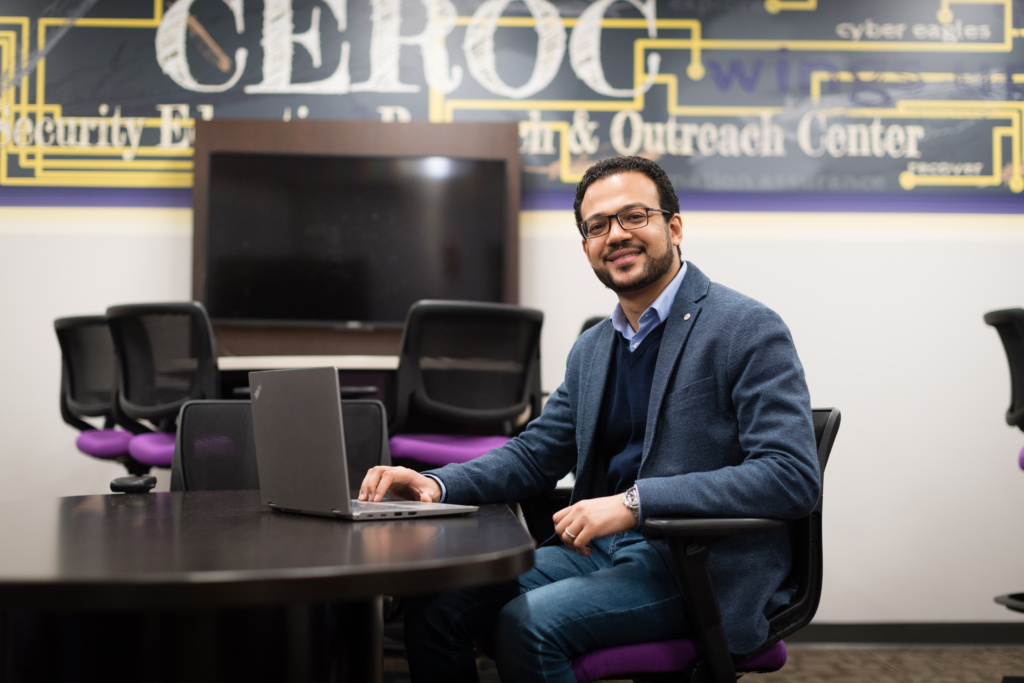(This post was authored by the College of Engineering)
Tennessee Tech’s Cybersecurity Education, Research and Outreach Center working to fill the gap

Colonial Pipeline has restored operations after a ransomware attack forced a six-day shutdown of the 5,500-mile pipeline that led to panic-buying gas shortages in the Southeast, but a leading cybersecurity expert warns the attack and its repercussions exposed an ongoing problem facing the nation’s critical infrastructure: A gap in the U.S. cybersecurity workforce.
“First, this is a wake-up call for these companies to strength their cybersecurity defense,” said Muhammad Ismail, Ph.D., an assistant professor of computer science in Tennessee Tech’s College of Engineering and an expert in cyber-physical systems security for the school’s Cybersecurity Education, Research and Outreach Center (CEROC). “Second, cyberwarfare is a reality. Future wars will no longer be traditional, and the country needs to be prepared on both the defensive and offensive sides. This starts by closing the cybersecurity workforce gap.”
To do that, banks, utilities, hospitals logistics companies and supply chains need to ramp up their cybersecurity workforces to defend the billions of internet connections spurred by organizations’ increasing reliance on remote systems to operate. The number of cellular Internet of Things (IoT) connections is expected to reach 3.5 billion in 2023, according to a 2018 report by telecommunications company Ericsson.
The U.S. has a total employed cybersecurity workforce of 956,341 professionals as of March, but there are still more than 460,000 jobs going unfilled. The supply of cybersecurity workers is categorized as “very low,” according to Cyber Seek, a project supported by the National Initiative for Cybersecurity Education.
In Tennessee, the workforce gap mirrors what is happening around the rest of the country, with a cybersecurity workforce of 11,000 and job openings of 5,500 throughout the state.
These numbers will grow in the immediate future as cybersecurity experiences job growth of 31 percent between 2019 and 2029, Ismail said.
Americans are familiar with schemes that hack their personal information, and those should be taken seriously. “But targeted cyberattacks on cyber-physical systems–especially for critical infrastructures like the power grid, water grid, and oil and gas pipelines—are a growing threat that can affect the entire country or a significant portion of the population,” Ismail said.
The far-reaching effects of such events is clear: After the Colonial Pipeline shutdown, U.S. fuel prices rose six cents (up to fourteen cents in some pumps) per gallon in a week.
“What we have seen is that in the future, a more powerful attack that lasts for an extended period would affect fuel prices, affecting every American,” Ismail said. “Everyone should be concerned.”
In the meantime, government officials and universities have mobilized to ensure the country and its industries are prepared with an army of professionals. Tennessee Tech’s CEROC—where Ismail is an affiliate—is no exception. “We are investing in the future direction of cybersecurity,” he said.
Launched in 2015 and led by Ambereen Siraj, Ph.D., CEROC is home to one of the only three, four-year programs in Tennessee designated by the National Security Administration and Department of Homeland Security as Centers of Academic Excellence in Cyber Defense Education. Tech also has the only Tennessee program to offer cybersecurity-specialized degrees at the bachelor’s, master’s and doctoral levels.
Tennessee Tech has provided 45 students with federally funded scholarships from two programs designed to encourage recruitment of the nation’s top cyber talent. The CyberCorps: Scholarship for Service (SFS) Program provides undergraduate and graduate students up to three years of support from the National Science Foundation in exchange for a commitment to work for the U.S. Government in a position related to cybersecurity. The Department of Defense (DoD) Cyber Scholarship Program (CySP) offers scholarships to students pursuing a cyber-related degree at National Centers of Academic Excellence in Cybersecurity, Cyber Defense Research or Cyber Operations in exchange for working for the DoD in a position related to cybersecurity.
CEROC is equipped with resources that can help students develop hands-on experience on cyberattack and defense strategies. Its CyberRange offers a training and test environment for students and interest groups to learn these skills and conduct research.
The university’s computer science department added five faculty members in 2019—four of which are focused on cybersecurity—and new courses cover state-of-the-art topics in cybersecurity. In one recent course, students built the kind of Supervisory Control and Data Acquisition systems used by pipelines and power grids, launched attacks, and defended these systems. In the upcoming fall semester, a course taught by Maanak Gupta, Ph.D., assistant professor of computer science, will include the use of artificial intelligence and machine learning in cybersecurity. Ismail’s recent research examines machine learning techniques for detecting false data injection attacks on power grids.
Ismail stressed the importance of hands-on experience in training future cybersecurity professionals.
“Our courses provide students with experience through extensive labs and demos to prepare them with the skill sets needed to defend the country’s infrastructure,” Ismail said. “However, as you can see from the (low supply) numbers, the cybersecurity workforce gap is still very high. There is tremendous opportunity here to fill this gap and ensure the U.S. can stay always one-step ahead.”
For more information on Tennessee Tech College of Engineering cybersecurity programs, visit: https://tntech.edu/CEROC
